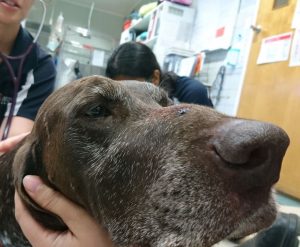Animals in Need



 Bandit came to Uni Vets Camden with a nasty skin infection, that appeared after he enjoyed one of his favorite pastimes; swimming.
Bandit came to Uni Vets Camden with a nasty skin infection, that appeared after he enjoyed one of his favorite pastimes; swimming.
Bandit was seen by Dr Tina Baxter, and he was diagnosed with atopic dermatitis and a secondary bacterial infection. Atopic dermatitis is a type of allergic reaction, common in dogs, usually due to airborne particles like pollens, dust mites or moulds. This reaction can cause itching and a break in the skin barrier, which can lead to secondary infections.
An intradermal allergy test was performed to find out which particular airborne substances trigger Bandits allergy. This is where extracts of pollens, dust mites and moulds are injected into the skin and the reaction is measured. Bandit reacted to the grass he had been rolling in after his swim!
Now that we know what Bandit is allergic to, desensitisation is possible with an 'allergy vaccine'. Over time, this can reduce allergic reaction, itch and infection, so he can still enjoy his swimming.
Thanks Dr Tina!
Written by Rebecca Blanchette, final year veterinary student, University of Sydney